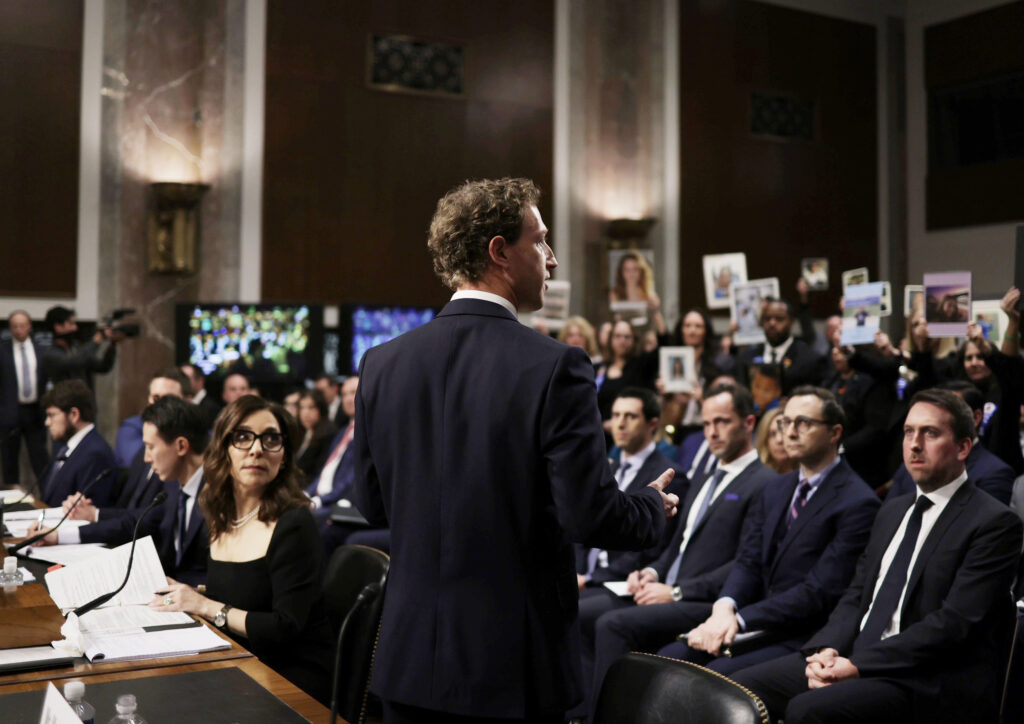Five CEOs of some of the most prominent social media companies felt pressure from lawmakers and parent advocates on Wednesday at a high-profile Senate Judiciary Committee hearing, at which they were confronted about the harms suffered by teenagers on their platforms and asked to back new rules for the industry.
Meta CEO Mark Zuckerberg, X CEO Linda Yaccarino, TikTok CEO Shou Zi Chew, Snap CEO Evan Spiegel, and Discord CEO Jason Citron were questioned about their companies’ policies regarding teenagers and sexual content. Senators across the aisle spent their time accusing the CEOs of failing to do enough to protect teenagers and of slowing efforts to enact legislation to implement new safeguards.
“[The tech companies’] design choices, their failures to adequately invest in trust and safety, and their constant pursuit of engagement and profit over basic safety have all put our kids and grandkids at risk,” Chairman Dick Durbin (D-IL) said in his opening remarks.
The hearing opened with a video featuring testimonies from various victims of online sexual exploitation. The hearing’s audience was filled to the brim with parent advocates, who lifted pictures of their children they said had died by suicide because of social media. The air was tense as attendees applauded Sen. Lindsey Graham’s (R-SC) opening accusation that Zuckerberg has “blood on his hands.”
Graham and Sens. Amy Klobuchar (D-MN) and Richard Blumenthal (D-CT) attempted to get the five CEOs to back their bills that intend to rein in Big Tech. These bills include the EARN IT Act, which would amend a key communications law that protects platforms for what others post in order to hold technology companies accountable for hosting child sex abuse material. It also includes the Kids Online Safety Act, which would force tech companies to implement controls for underage users, including options for limiting screen time, restricting addictive features, and limiting access to user profiles.
The lawmakers tried to get the CEOs to support the legislation in simple “yes or no” terms. The heads of the companies attempted to express what they liked and disliked about the relevant bills but were generally shut down.
Yaccarino said she supported the Stop CSAM Act, legislation that would give law enforcement more tools for cracking down on child pornography such as breaking through encryptions, as well as KOSA. Spiegel also affirmed his support for KOSA. The company announced its support on Jan. 25.
The majority of the committee appeared frustrated with the lack of action on the legislation by the Senate as a whole. The committee approved KOSA and EARN IT in July, leaving the bills’ fate on the Senate floor, where they have languished.
Sen. Marsha Blackburn (R-TN), one of the authors of KOSA, accused the Big Tech companies of using their “armies of lawyers and lobbyists” to attack the legislation and stop its passage. Senate Majority Leader Chuck Schumer (D-NY) came up as a target to blame for the delay, with Sen. John Kennedy (R-LA) saying he should “go to Amazon, buy a spine online,” and bring these bills to the floor. Blumenthal said he was working with Schumer to get these bills up for a floor vote but was unable to establish a deadline.
Zuckerberg received the most fire from lawmakers during his appearance. Blumenthal questioned him about internal emails from 2021 in which he appeared to decline to increase Meta’s spending on teenage mental wellness protections, although Zuckerberg was not given a chance to respond. Sen. Ted Cruz (R-TX) turned his ire toward the Facebook founder, demanding details about how many people were seeking child sexual abuse material on his platforms. Blackburn also accused Zuckerberg of making Meta the “premier sex trafficking platform,” a notion he called “ridiculous.”

Perhaps the most memorable moment came when Zuckerberg apologized to the relatives of minors who died by suicide after facing bullying or sexual exploitation on social media.
CLICK HERE TO READ MORE FROM THE WASHINGTON EXAMINER
Chew also received a significant amount of attention, with Sens. Tom Cotton (R-AR) and Josh Hawley (R-MO) accusing the Singaporean-born executive of being a tool of the Chinese Communist Party. Chew has faced similar questioning in previous appearances on Capitol Hill.
The one CEO who seemed to get little attention from the committee was Yaccarino, who said that “less than 1%” of X’s users are teenagers. Yaccarino separated X from Twitter’s previous leadership by emphasizing how X was a “new company” rather than acknowledging the 16 years of history before Elon Musk bought Twitter in October 2022.
